Related Research Articles
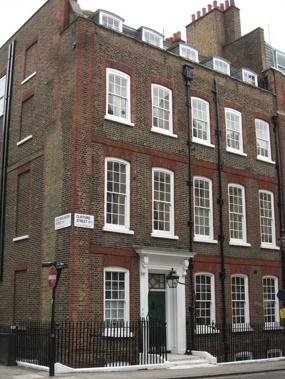
The Drones Club is a recurring fictional location in the stories of British humorist P. G. Wodehouse. It is a gentlemen's club in London. Many of Wodehouse's Jeeves and Blandings Castle stories feature the club or its members.

Jeeves is a fictional character in a series of comedic short stories and novels by English author P. G. Wodehouse. Jeeves is the highly competent valet of a wealthy and idle young Londoner named Bertie Wooster. First appearing in print in 1915, Jeeves continued to feature in Wodehouse's work until his last completed novel Aunts Aren't Gentlemen in 1974, a span of 60 years.

Agatha Gregson, née Wooster, later Lady Worplesdon, is a recurring fictional character in the Jeeves stories of the British comic writer P. G. Wodehouse, being best known as Bertie Wooster's Aunt Agatha. Haughty and overbearing, Aunt Agatha wants Bertie to marry a wife she finds suitable, though she never manages to get Bertie married, thanks to Jeeves's interference.

Bertram Wilberforce Wooster is a fictional character in the comedic Jeeves stories created by British author P. G. Wodehouse. An amiable English gentleman and one of the "idle rich", Bertie appears alongside his valet, Jeeves, whose intelligence manages to save Bertie or one of his friends from numerous awkward situations. Bertie Wooster and Jeeves have been described as "one of the great comic double-acts of all time".

Augustus "Gussie" Fink-Nottle is a recurring fictional character in the Jeeves novels of comic writer P. G. Wodehouse, being a lifelong friend of Jeeves's master Bertie Wooster and a country member of the Drones Club. He wears horn-rimmed spectacles and studies newts.
Dahlia Travers is a recurring fictional character in the Jeeves stories of English comic writer P. G. Wodehouse, being best known as Bertie Wooster's bonhomous, red-faced Aunt Dahlia. She is much beloved by her nephew, in contrast with her sister, Bertie's Aunt Agatha.

Madeline Bassett is a fictional character in the Jeeves stories by English comic writer P. G. Wodehouse, being an excessively sentimental and fanciful young woman to whom Bertie Wooster intermittently, and reluctantly, finds himself engaged.
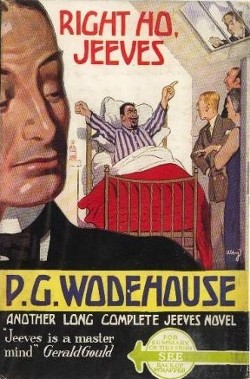
Right Ho, Jeeves is a novel by P. G. Wodehouse, the second full-length novel featuring the popular characters Jeeves and Bertie Wooster, after Thank You, Jeeves. It was first published in the United Kingdom on 5 October 1934 by Herbert Jenkins, London, and in the United States on 15 October 1934 by Little, Brown and Company, Boston, under the title Brinkley Manor. It had also been sold to the Saturday Evening Post, in which it appeared in serial form from 23 December 1933 to 27 January 1934, and in England in the Grand Magazine from April to September 1934. Wodehouse had already started planning this sequel while working on Thank You, Jeeves.
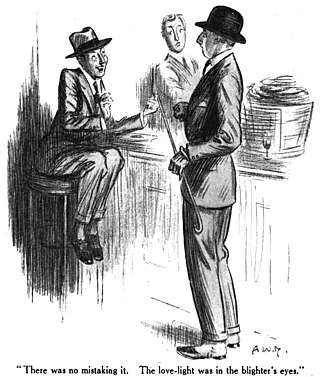
Richard P. "Bingo" Little is a recurring fictional character in the comedic Jeeves and Drones Club stories of English writer P. G. Wodehouse, being a friend of Jeeves's master Bertie Wooster and a member of the Drones Club.
Rosie M. Banks is a recurring fictional character in the Jeeves and Drones Club stories of British author P. G. Wodehouse, being a romance novelist and the wife of Bingo Little.

Honoria Glossop is a recurring fictional character in the Jeeves stories by English comic writer P. G. Wodehouse. Athletic as well as scholarly, she is a formidable young lady and one of the women whom Bertie Wooster reluctantly becomes engaged to.
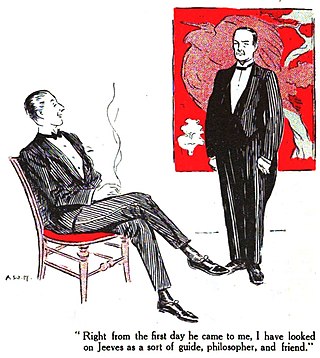
"Jeeves in the Springtime" is a short story by P. G. Wodehouse, and features the young gentleman Bertie Wooster and his valet Jeeves. The story was published in The Strand Magazine in December 1921 in London, and in Cosmopolitan in New York that same month. The story was also included in the 1923 collection The Inimitable Jeeves as two separate chapters, "Jeeves Exerts the Old Cerebellum" and "No Wedding Bells for Bingo".
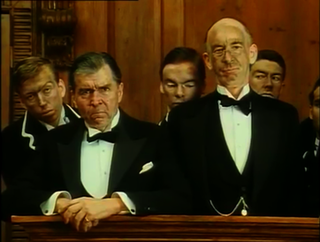
Sir Roderick Glossop is a recurring fictional character in the comic novels and short stories of P. G. Wodehouse. Sometimes referred to as a "nerve specialist" or a "loony doctor", he is a prominent practitioner of psychiatry in Wodehouse's works, appearing in several Jeeves stories and in one Blandings Castle story.
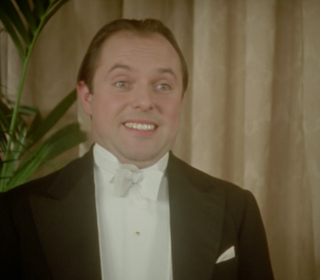
Hildebrand "Tuppy" Glossop is a recurring fictional character in the Jeeves stories by humorist P. G. Wodehouse. Tuppy is a member of the Drones Club, a friend of Bertie Wooster, and the fiancé of Angela Travers, Bertie's cousin.

The Mating Season is a novel by P. G. Wodehouse, first published in the United Kingdom on 9 September 1949 by Herbert Jenkins, London, and in the United States on November 29, 1949, by Didier & Co., New York.
The following is a list of recurring or notable fictional locations featured in the stories of P. G. Wodehouse, in alphabetical order by place name.

"The Purity of the Turf" is a short story by P. G. Wodehouse, and features the young gentleman Bertie Wooster and his valet Jeeves. The story was published in The Strand Magazine in London in July 1922, and in Cosmopolitan in New York that same month. The story was also included in the 1923 collection The Inimitable Jeeves.

What Ho! Jeeves is a series of radio dramas based on some of the Jeeves short stories and novels written by P. G. Wodehouse, starring Michael Hordern as the titular Jeeves and Richard Briers as Bertie Wooster.
References
- Notes
- ↑ Wodehouse, P. G. (2011). Hedgcock, Murray (ed.). Wodehouse at the Wicket. Arrow Books. p. 197. ISBN 978-0099551362.
- ↑ Garrison (1991), p. 152–153.
- ↑ Wodehouse (2008) [1949], The Mating Season, chapter 2, pp. 14–15.
- ↑ Wodehouse, P. G. (2008) [1939]. Uncle Fred in the Springtime (Reprinted ed.). Arrow Books. ISBN 978-0099513841. Chapter 4, p. 54. Catsmeat is also mentioned in chapter 1.
- ↑ Wodehouse (2008) [1934],Thank You, Jeeves, chapter 12, p. 138.
- ↑ Wodehouse (2008) [1934], Right Ho, Jeeves, chapter 22, p. 262.
- 1 2 Ring & Jaggard (1999), pp. 203–204.
- ↑ Wodehouse, P. G. (2008) [1947]. "Chapter 25". Joy in the Morning (Reprinted ed.). London: Arrow Books. pp. 237–238. ISBN 978-0099513766.
- ↑ Cawthorne (2013), p. 217.
- ↑ "Jeeves and Wooster Series 3, Episode 4". British Comedy Guide. BBC. Retrieved 15 January 2018.
- ↑ "What Ho, Jeeves!: 1: Deverill Hall". BBC Genome Project. BBC. 30 July 1975. Retrieved 15 January 2018.
- Bibliography
- Cawthorne, Nigel (2013). A Brief Guide to Jeeves and Wooster. Constable & Robinson. ISBN 978-1-78033-824-8.
- Garrison, Daniel H. (1991) [1989]. Who's Who in Wodehouse (Revised ed.). Constable & Robinson. ISBN 1-55882-087-6.
- Reggie (16 March 2007). "Wodehouse Who's Who: Claude Pirbright". Blandings, a Companion to the Works of P. G. Wodehouse. Archived from the original on 27 September 2007. Retrieved 22 July 2007.
- Ring, Tony; Jaggard, Geoffrey (1999). Wodehouse in Woostershire. Porpoise Books. ISBN 1-870-304-19-5.
- Wodehouse, P. G. (2008) [1934]. Thank You, Jeeves (Reprinted ed.). London: Arrow Books. ISBN 978-0099513735.
- Wodehouse, P. G. (2008) [1934]. Right Ho, Jeeves (Reprinted ed.). London: Arrow Books. ISBN 978-0099513742.
- Wodehouse, P. G. (2008) [1949]. The Mating Season (Reprinted ed.). London: Arrow Books. ISBN 978-0099513773.